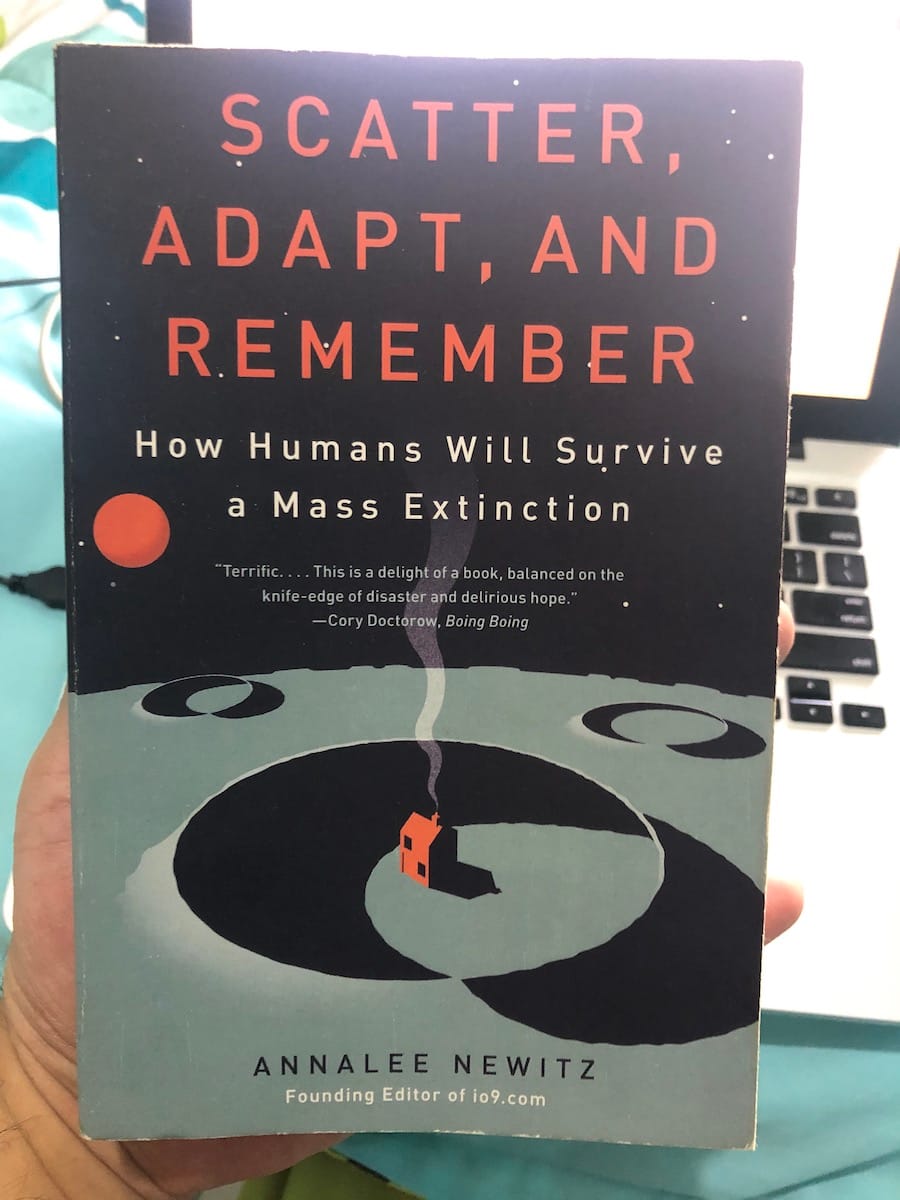How humans can survive the apocalypse
Surviving means saving a living Earth, not hunkering down in a barren world.

A book on mass extinction happens to be one of the most inspiring things I’ve ever read.
If you love science, I highly recommend “Scatter, Adapt, and Remember: How Humans Will Survive a Mass Extinction” by Annalee Newitz.
I’ve read this beautifully written book many times. It’s somewhat ironic considering this book tackles the inevitability of one apocalypse or another causing a mass extinction on Earth. Yet it fills me with pragmatic optimism that humanity will survive, not because of some vague hope, but through science and the strategies that our ancestors and different species have employed in order to avoid extinction.

Newitz (pronouns: they/them) is one of my favourite writers. They were the founder of my go-to science and science fiction blog io9 and served as the editor-in-chief of Gizmodo. They have also written science fiction novels. I love their 2017 debut science fiction novel, ”Autonomous”, and highly recommend it. As Neal Stephenson puts it: “Autonomous is to biotech and AI what Neuromancer was to the Internet.”
Blunt yet highly engaging, “Scatter, Adapt, and Remember” doesn’t sugarcoat the apocalypse. Newitz accepts that everything they have read in science and science fiction leads to this dark conclusion: ”Humans are screwed, and so is our planet.”
Facing the truth, no matter how dark, is what we need to do in order to survive.u
A mass extinction is also known as an extinction event or biotic crisis. It is a catastrophic event that wipes out 75% to more than 90% of all species in a geological blink of an eye. Since the Cambrian, Earth has experienced five mass extinctions.
The Big Five includes the Cretaceous-Tertiary extinction event (K-T event). This led to the extinction of non-avian dinosaurs, with only avian dinosaurs surviving.
“Birds are the only dinosaurs left. That might seem strange. A pigeon or a penguin doesn’t look much like a Tyrannosaurus. But the connection is still there, all the way down to the bone. About 150 million years ago, in the Jurassic, the first birds evolved from small, feathery, raptor-like dinosaurs, becoming another branch on the dinosaur family tree. For more than 80 million years, birds of all sorts flourished, from loon-like swimmers with teeth to beaked birds that carried streamer-like feathers as they flew.
“With hindsight, birds can be categorized as avian dinosaurs and all the other sorts—from Stegosaurus to Brontosaurus—are non-avian dinosaurs. The entire reason paleontologists make that split is because of a catastrophe that struck 66 million years ago. An asteroid more than 6 miles across struck what’s now the Yucatan Peninsula, triggering the fifth mass extinction in the world’s history. Some of the debris thrown into the atmosphere returned to Earth, the friction turning the air into an oven and sparking forest fires as it landed all over the world. Then the intensity of the heat pulse gave way to a prolonged impact winter, the sky blotted out by soot and ash as temperatures fell. All told, more than 75 percent of species known from the end of the Cretaceous period, 66 million years ago, didn’t make it to the following Paleogene period. The geologic break between the two is called the K-Pg boundary, and beaked birds were the only dinosaurs to survive the disaster.”
A number of scientists believe the sixth mass extinction is already underway.
“Although biologists are still debating how much the current extinction rate exceeds the background rate, even the most conservative estimates reveal an exceptionally rapid loss of biodiversity typical of a mass extinction event.”
Humans are said to be the culprit behind accelerating the rate of extinction. We have dramatically changed natural landscapes and caused climate change. Some have even called this geological epoch the Anthropocene or Human Epoch to underscore the impact of humans.
Others have criticised the arrogance of naming an epoch after ourselves and inflating our own importance. After all, human history is just a small blip in this planet’s history, and we could very well be gone in the blink of an eye.
Newitz, however, is not interested in what kind of apocalypse we will face, or what will cause it. Instead, they want us to be prepared.
”My point is that regardless of whether humans are responsible for the sixth mass extinction on Earth, it’s going to happen. Assigning blame is less important than figuring out how to prepare for the inevitable and survive it. And when I say ‘survive it,’ I don’t mean as humans alone on a world gone to hell. Survival must include the entire planet, and its myriad ecosystems, because those are what keep us fed and healthy.”
Annalee Newitz and their partner, Charlie Jane Anders, another favourite author of mine. Anders, who is transgender (pronouns: she/her), won the 2012 Hugo Award for Best Novelette for “Six Months, Three Days”, which I loved. Not only is it awesome and though-provoking, but also this brilliant novelette unexpectedly mentions the beloved Filipino mascot Jollibee not just once, but twice. In 2017, she won the Nebula Award for Best Novel for her 2016 speculative fiction debut novel, “All the Birds in the Sky”. Newitz and Anders won the 2019 Hugo Award for Best Fancast for the Our Opinions Are Correct podcast.
I like that Newitz recognises that humankind doesn’t stand apart from the rest of the ecosystem. Surviving means saving a living Earth, not hunkering down in a barren world, or escaping to another planet.
What Newitz reminds us in this book is that humans have come close to extinction several times in the last million years.
It is fascinating to read how our ancestors found a way to survive, against all odds. “Scatter, Adapt, and Remember“ also inspires us by reminding us how life on Earth has come close to total annihilation several times. Yet somehow, a few creatures survived and found a way to adapt to the new environment.
“Humanity’s story must be one of constant change because that is one way to transmute hope,” Newitz says.
We are all here because our ancestors found a way to survive.
We are survivors. We must never forget that.

